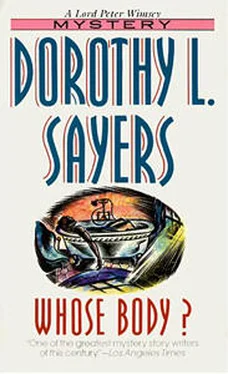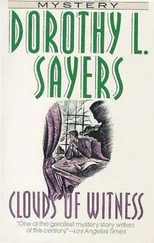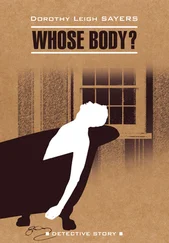«I am an amateur,» said Lord Peter.
Nevertheless, while communing with Dante, he made up his mind.
In the afternoon he found himself in Harley Street. Sir Julian Freke might be consulted about one's nerves from two till four on Tuesdays and Fridays. Lord Peter rang the bell.
«Have you an appointment, sir?» enquired the man who opened the door.
«No,» said Lord Peter, «but will you give Sir Julian my card? I think it possible he may see me without one.»
He sat down in the beautiful room in which Sir Julian's patients awaited his healing counsel. It was full of people. Two or three fashionably dressed women were discussing shops and servants together, and teasing a toy griffon. A big, worried-looking man by himself in a corner looked at his watch twenty times a minute. Lord Peter knew him by sight. It was Wintrington, a millionaire, who had tried to kill himself a few months ago. He controlled the finances of five countries, but he could not control his nerves. The finances of five countries were in Sir Julian Freke's capable hands. By the fireplace sat a soldierly-looking young man, of about Lord Peter's own age. His face was prematurely lined and worn; he sat bolt upright, his restless eyes darting in the direction of every slightest sound. On the sofa was an elderly woman of modest appearance, with a young girl. The girl seemed listless and wretched; the woman's look showed deep affection, and anxiety tempered with a timid hope. Close beside Lord Peter was another, younger woman, with a little girl, and Lord Peter noticed in both of them the broad cheekbones and beautiful, grey, slanting eyes of the Slav. The child, moving restlessly about, trod on Lord Peter's patent-leather toe, and the mother admonished her in French before turning to apologize to Lord Peter.
«Mais je vous en prie, madame,» said the young man, «it is nothing.»
«She is nervous, pauvre petite,» said the young woman.
«You are seeking advice for her?»
«Yes. He is wonderful, the doctor. Figure to yourself, monsieur, she cannot forget, poor child, the things she has seen.» She leaned nearer, so that the child might not hear. «We have escaped — from starving Russia — six months ago. I dare not tell you — she has such quick ears, and then, the cries, the tremblings, the convulsions — they all begin again. We were skeletons when we arrived — mon Dieu! — but that is better now. See, she is thin, but she is not starved. She would be fatter but for the nerves that keep her from eating. We who are older, we forget — enfin, on apprend a ne pas y penser — but these children! When one is young, monsieur, tout ca impressionne trop.»
Lord Peter, escaping from the thraldom of British good form, expressed himself in that language in which sympathy is not condemned to mutism.
«But she is much better, much better,» said the mother, proudly, «the great doctor, he does marvels.»
«C'est un homme precieux,» said Lord Peter.
«Ah, monsieur, c'est un saint qui opere des miracles! Nous prions pour lui, Natasha et moi, tous les jours. N'est-ce pas, cherie? And consider, monsieur, that he does it all, ce grand homme, cet homme illustre, for nothing at all. When we come here, we have not even the clothes upon our backs — we are ruined, famished. Et avec ca que nous sommes de bonne famille — mais helas! monsieur, en Russie, comme vous savez, ca ne vous vaut que des insultes — des atrocites. Enfin! the great Sir Julian sees us, he says — “Madame, your little girl is very interesting to me. Say no more. I cure her for nothing — pour ses beaux yeux, a-t-il ajoute en riant”. Ah, monsieur, c'est un saint, un veritable saint! and Natasha is much, much better.»
«Madame, je vous en felicite.»
«And you, monsieur? You are young, well, strong — you also suffer? It is still the war, perhaps?»
«A little remains of shell-shock,» said Lord Peter.
«Ah, yes. So many good, brave, young men —»
«Sir Julian can spare you a few minutes, my lord, if you will come in now,» said the servant.
Lord Peter bowed to his neighbour, and walked across the waiting-room. As the door of the consulting-room closed behind him, he remembered having once gone, disguised, into the staff-room of a German officer. He experienced the same feeling — the feeling of being caught in a trap, and a mingling of bravado and shame.
He had seen Sir Julian Freke several times from a distance, but never close. Now, while carefully and quite truthfully detailing the circumstances of his recent nervous attack, he considered the man before him. A man taller than himself, with immense breadth of shoulder, and wonderful hands. A face beautiful, impassioned and inhuman; fanatical, compelling eyes, bright blue amid the ruddy bush of hair and beard. They were not the cool and kindly eyes of the family doctor, they were the brooding eyes of the inspired scientist, and they searched one through.
«Well,» thought Lord Peter, «I shan't have to be explicit, anyhow.»
«Yes,» said Sir Julian, «yes. You had been working too hard. Puzzling your mind. Yes. More than that, perhaps — troubling your mind, shall we say?»
«I found myself faced with a very alarming contingency.»
«Yes. Unexpectedly, perhaps.»
«Very unexpected indeed.»
«Yes. Following on a period of mental and physical strain.»
«Well — perhaps. Nothing out of the way.»
«Yes. The unexpected contingency was — personal to yourself?»
«It demanded an immediate decision as to my own actions yes, in that sense it was certainly personal.»
«Quite so. You would have to assume some responsibility, no doubt.»
«A very grave responsibility.»
«Affecting others besides yourself?»
«Affecting one other person vitally, and a very great number indirectly.»
«Yes. The time was night. You were sitting in the dark?»
«Not at first. I think I put the light out afterwards.»
«Quite so — that action would naturally suggest itself to you. Were you warm?»
«I think the fire had died down. My man tells me that my teeth were chattering when I went in to him.»
«Yes. You live in Piccadilly?»
«Yes.»
«Heavy traffic sometimes goes past during the night, I expect.»
«Oh, frequently.»
«Just so. Now this decision you refer to — you had taken that decision.»
«Yes.»
«Your mind was made up?»
«Oh, yes.»
«You had decided to take the action, whatever it was.»
«Yes.»
«Yes. It involved perhaps a period of inaction.»
«Of comparative inaction — yes.»
«Of suspense, shall we say?»
«Yes — of suspense, certainly.»
«Possibly of some danger?»
«I don't know that that was in my mind at the time.»
«No — it was a case in which you could not possibly consider yourself.»
«If you like to put it that way.»
«Quite so. Yes. You had these attacks frequently in 1918?»
«Yes — I was very ill for some months.»
«Quite. Since then they have recurred less frequently?»
«Much less frequently.»
«Yes — when did the last occur?»
«About nine months ago.»
«Under what circumstances?»
«I was being worried by certain family matters. It was a question of deciding about some investments, and I was largely responsible.»
«Yes. You were interested last year, I think in some police case?»
«Yes — in the recovery of Lord Attenbury's emerald necklace.»
«That involved some severe mental exercise?»
«I suppose so. But I enjoyed it very much.»
«Yes. Was the exertion of solving the problem attended by any bad results physically?»
«None.»
«No. You were interested, but not distressed.»
«Exactly.»
«Yes. You have been engaged in other investigations of the kind?»
Читать дальше












